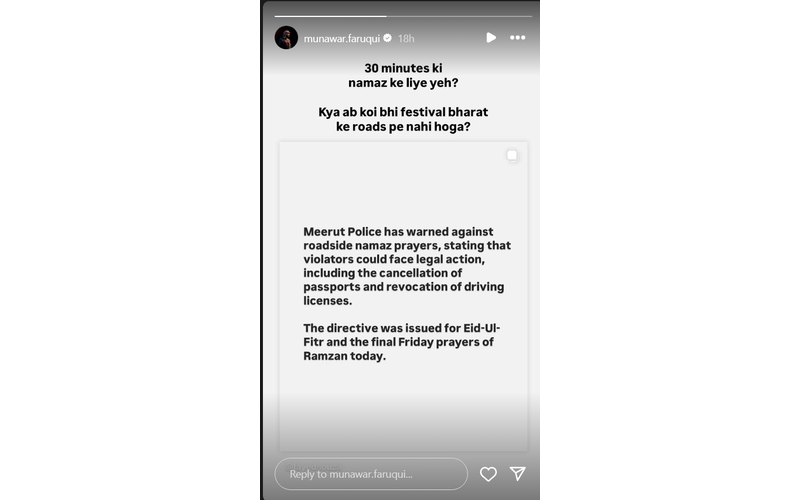Munawar Faruqui, the well-known comedian and Bigg Boss 17 winner, has strongly voiced his opinion against a recent directive from the Meerut Police. The order prohibits Muslims from offering Eid prayers on public highways, particularly on the final Friday prayers of Ramzan on March 28 and during Eid-Ul-Fitr. Violators could face severe consequences, including the cancellation of passports and driver’s licenses.
Sharing his frustration on Instagram, Munawar questioned the necessity of such a strict rule. Expressing disbelief, he wrote, “30 minutes ki namaz ke liye yeh? Kya ab koi bhi festival Bharat ke roads pe nahi hoga?” His words highlighted his concerns about the perceived selective nature of the rule. His statement quickly gained traction online, with many users echoing his sentiments and criticizing the directive.

This isn’t the first time Munawar has found himself in the middle of a controversy. Recently, his comedy show Hafta Vasooli faced backlash for its satirical approach to political and cultural topics. Critics accused him of using inappropriate language and promoting obscenity, leading to calls for a boycott. Despite the criticism, Munawar’s support from his fans remains strong.
In 2021, Munawar was arrested on charges of offending religious sentiments during a stand-up performance. He spent over a month in jail before being granted bail. The incident remains a significant chapter in his career, shaping his approach to navigating social and political topics in his work.
Interestingly, Munawar’s recent remarks on the police order came shortly after a spiritual milestone in his life. Just a week prior, he traveled to Mecca to perform Umrah with his wife, Mehzabeen Coatwala, whom he privately married in 2024. Reflecting on his visit, he described Mecca as “the most beautiful place in the world.” His heartfelt message extended prayers for others, saying, “Allah sabko yanha bulaye. Aur dua aap sabke liye ki hai maine. Mujhe bhi apni dua mein yaad rakhna.”
The timing of his religious pilgrimage and his outspoken criticism of the Meerut Police’s directive further drew attention to Munawar’s layered identity as both a comedian and a socially conscious figure. While his supporters appreciate his candor, his detractors often target him for his unfiltered views.
The conversation surrounding the police order has grown, with many questioning the broader implications of restricting public expressions of faith. Munawar’s post has undoubtedly amplified the debate, encouraging reflection on the delicate balance between public order and religious freedom in a diverse society.








